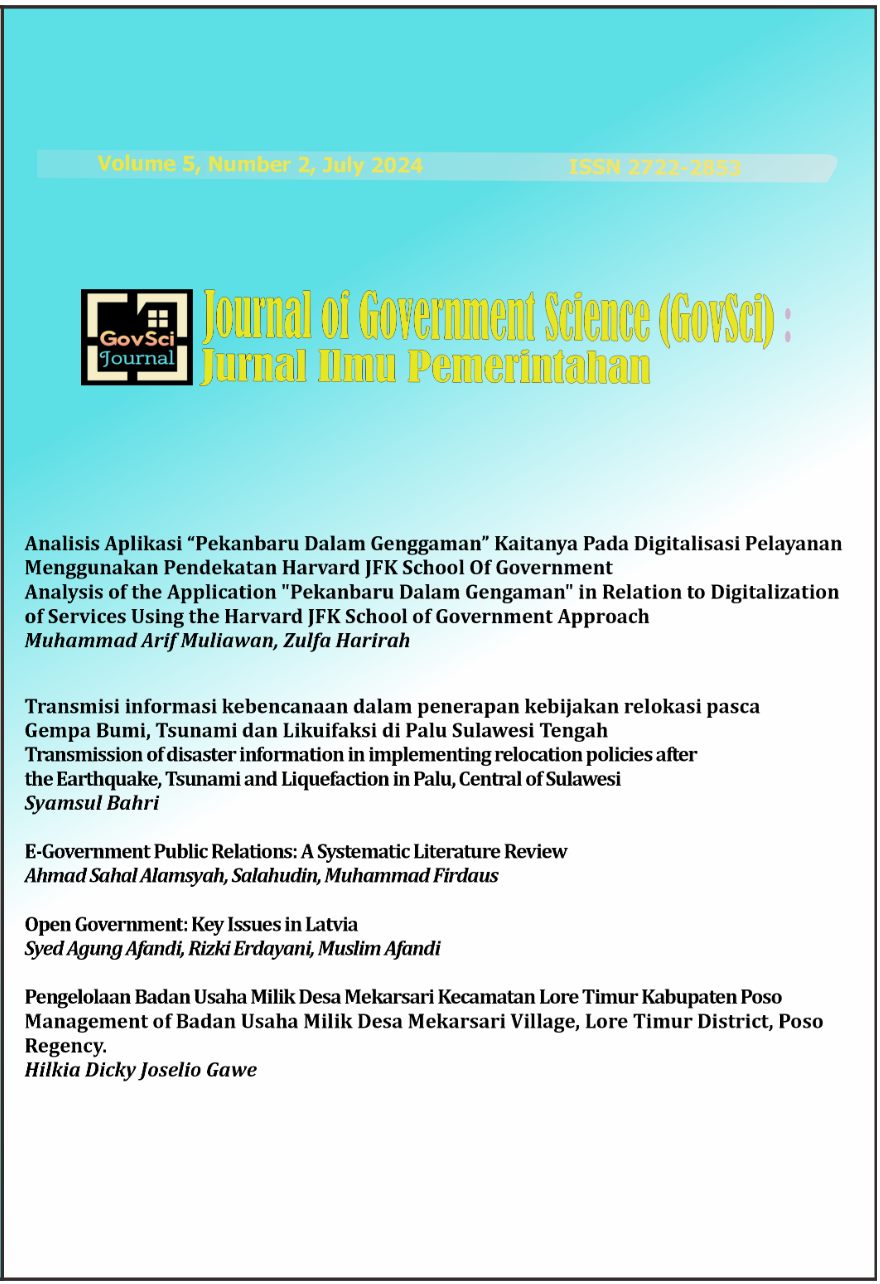Analisis Aplikasi “Pekanbaru Dalam Genggaman” Kaitanya Pada Digitalisasi Pelayanan Menggunakan Pendekatan Harvard JFK School Of Government Analysis of the Application "Pekanbaru Dalam Gengaman" in Relation to Digitalization of Services Using the Harvard JFK School of Government Approach
Abstract
The phenomenon of digital literacy has become a hot topic of discussion during the Covid-19 pandemic. Digital transformation in various community activities and public services managed by the government during the pandemic continues to this day. One of the innovations made by the Pekanbaru City Government is to create an electronic-based government application, namely "Pekanbaru Dalam Genggaman". This study aims to determine the effectiveness of using the "Pekanbaru Dalam Genggaman" application in providing public services to the community in relation to the digitalization of services. This study uses a qualitative approach where data sources are obtained from direct observation of the Pekanbaru Dalam Genggaman application and through literature studies of books, journals, articles, and other sources that are in accordance with the research topic. To analyze the concepts of digitalization in public services, this study uses an approach from the Harvard JFK School of Government, there are three elements of success that must be possessed, namely support, capacity, and value (benefits). The results of this study suggest that to apply the concepts of digitalization to public services, there are three elements of success that must be possessed, namely support, ability, and benefits. In terms of support, the government has deployed two to four IT personnel in each agency, but the infrastructure to support public services through digital is not yet optimal. In terms of capability, it is also considered unsuccessful, because 5 of the 16 features in the Pekanbaru Dalam Genggaman application do not function, of which 3 of the 5 features that do not function are very important for the community. In terms of benefits, only a small portion of the community feels the benefits. Because there are still many people who do not know about the existence of this application.
References
Alusi, F., & Sensuse, D. I. (2014). Penyusunan Strategi E-Government Berbasis Kerangka Kerja Pemeringkatan E-Government Indonesia (PEGI) Di Lembaga Penerbangan dan Antariksa Nasional. Journal of Information Systems, 10(1), 37–44.
Aptika, A. (2022). ASN Cakap Digital Pacu Optimalisasi Layanan Publik.
Bukit, B., Malusa, T., & Rahmat, A. (2017). Pengembangan Sumber Daya Manusia. In Zahir Publishing.
Estiningsih, H. M., & Hum, M. (2023). Indonesia Cakap Digital Melalui Kegiatan Literasi Digital Bagi Seluruh Aparatur Sipil Negara ( Asn ). Jurnal Pengabdian Masyarakat, 1(5), 695–704.
Faqih A, W. A. (2019). Strategi Pengembangan Sdm Dalam Persaingan Bisnis Industri Kreatif Di Era Digital. ’Adliya, 13(1), 115–126.
Fauzan, I. (2021). Transformasi Digital Audit Manajemen Aparatur Sipil Negara Dan Dampaknya Terhadap the Digital Transformation of Civil Servant Management Audit and Its Impact on Government. Civil Service, 15 (1), 37–50.
Indrajit, R. E. (2006). Elektronik Government: Strategi Pembangunan Dan Pengembangan Sistem Pelayanan Publik Berbasis Teknologi Digital. Penerbit Andi Yogyakarta.
Indrayani, E. (2016). E-Government Konsep, Implementasi dan Perkembangannya di Indonesia (Buku Literatur MK E-Government). In Ipdn (Issue February).
Nugraha, J. T. (2018). E-Government Dan Pelayanan Publik (Studi Tentang Elemen Sukses Pengembangan E-Government Di Pemerintah Kabupaten Sleman). Jurnal Komunikasi Dan Kajian Media, 2(1), 32–42.
Nurhakim, M. R. S. (2014). Implementasi E-Government Dalam Mewujudkan Transparansi Dan Akuntabilitas Sistem Pemerintahan Modern. Jurnal Ilmu Administrasi Media Pengembangan Dan Praktik Administrasi, 9(3), 403–422.
Prasodjo, T. (2023). Pelayanan Publik Era Digital (L. Murdi (ed.)). CV. Literasi Nusantara Abadi.
Riduwan, V. P., & Claretta, D. (2022). Strategi Humas SSC Kacapiring Surabaya Dalam Era Digitalisasi Pada Pandemi Covid-19. JKOMDIS : Jurnal Ilmu Komunikasi Dan Media Sosial, 2(2), 251–253. https://doi.org/10.47233/jkomdis.v2i3.344
Sellfia, N. R., Dayat, U., & Aryani, L. (2022). Inovasi pelayanan publik berbasis e-government dalam aplikasi sampurasun Purwakarta. Kinerja, 18(4), 590–598. https://doi.org/10.30872/jkin.v18i4.10363
Sugianto, M. A. (2021). Kebijakan Work From Home Era Covid-19: Kasus Kabupaten Badung. Jurnal Analis Kebijakan, 5(1), 87–98.
Sugiyono. (2013). METODE PENELITIAN KUANTITATIF, KUALITATIF, DAN R&D (1st ed.). Alfabeta.
Authors

This work is licensed under a Creative Commons Attribution-ShareAlike 4.0 International License.

